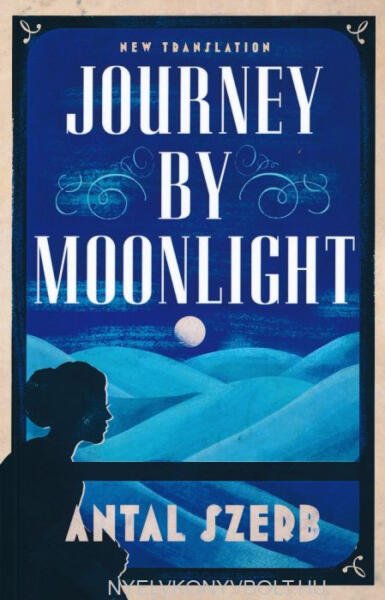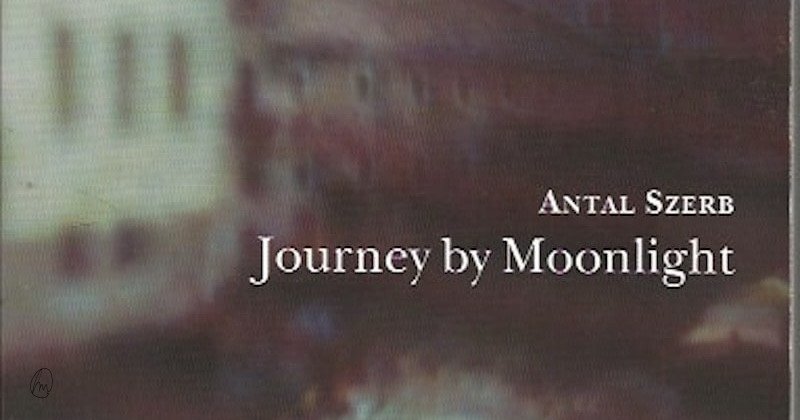– Antal Szerb’s Haunting Tale of Love, Loss, and the Unseen
Just like in so many areas of life, the boundary between pulp and literary fiction is often blurred. At these intersections, it’s ultimately a matter of personal taste and openness that determines how one defines what — and that, in itself, deserves respect.
This was certainly true of one of Antal Szerb’s works.

Szerb — born in 1901 in Budapest to an assimilated Jewish family, and later baptized Catholic in 1907 — embarked early on a rich and winding path toward adulthood. Don’t worry, this won’t turn into a dry biography. But it’s worth noting that Tóni (as some called him) graduated from the prestigious Piarist Gymnasium. It became clear early on, during his time with the Budapest Piarists, that he had a rare gift: the ability to express ideas and stories beautifully in writing. His teacher, Sándor Sík, encouraged him to keep practicing it. And so he did — writing and creating until the very end, which hit in slow, agonizing way when young members of the Nyilas (Hungary’s Nazi-aligned Arrow Cross Party) beat him to death with rifle butts near Balf.
Journey by Moonlight.
Whether this novel belongs to pulp or literary fiction — well, opinions vary.
Its messages can be blunt and direct, yet the underlying depth runs deep. And its language serves as a vivid reminder of just how rich and refined the Hungarian tongue can be. Alas, some of its essence may be lost on English readers — but its spirit still shines through, and the novel more than earns its due.
“The strange woman remained a stranger, just as the years of wandering had been little more than aimless drifting — but now he had to return home, to those who were not strangers. Only… they had long since died, carried away by the stray winds from the four corners of the earth.”
Note: All literary quotes from Antal Szerb’s Journey by Moonlight (Utas és holdvilág) are auto-translated for this article. They do not reflect any official English edition — which is an extra good reason to get a copy for yourself.
The story unfolds over just a few years in the life of its central character, Mihály, and his close-knit, vibrant circle of friends — from their teenage years into early adulthood.
Contrary to the common reading of the novel as a coming-of-age story, it is more accurately a meditation on mysticism — on the unknowability of life and the inevitability of certain destinies.
It tells how three once deeply entwined teenage friends — along with two others drawn into their orbit — are brought back together after a cathartic rupture had torn them apart.
It is a story about the depths of human connection.
And about how fate — or perhaps the will of the Almighty — guides these lives along winding paths, not to break their bond, but to bring it to a worthy close, so they might move forward. The novel ultimately centers on this: that the doors we leave ajar in life will, sooner or later, be closed — if not by us, then by fate’s quiet hand.
Szerb signals this theme throughout the novel — most notably about a third of the way in, when Mihály wanders into a mysterious house in London. He moves through a chain of rooms, as if following someone just out of sight, until he reaches the final chamber. There, he sits and waits, tense, gripped by the unsettling sense that someone is watching him from behind a wall tapestry. In those barely glimpsed eyes, Mihály saw the face of his closest childhood friend, Tamás Ulpius.
“Upstairs I found a door and a half-lit room. No one was there, but the door opposite had just closed, as if someone had left the moment before. Remembering the maid’s instructions, I walked through the room and opened the door that had just shut. Again, a dim, old-fashioned, dusty, tasteless room, and again, no one inside — except the opposite door was once more just closing, as if someone had exited. I walked through that room as well, then opened the third, and then the fourth door. Each time, the door before me shut gently, as if someone was moving just ahead. At last, in the fifth room — though ‘at last’ may be too strong, because that room too was empty — but here, at least, no door closed before me. There was only the door I had entered through. But the one who had walked ahead was no longer there… On the walls, pictures, rugs, and all sorts of worthless, outdated decor hung …The eyes — they were the eyes of a childhood friend, Tamás Ulpius, who had died very young, in tragic though unresolved circumstances.”
Note: All literary quotes from Antal Szerb’s Journey by Moonlight (Utas és holdvilág) are auto-translated for this article. They do not reflect any official English edition — which is an extra good reason to get a copy for yourself.
In that room, Mihály cried out — calling for Tamás.
After this moment — likely led by instinct, yet precisely staged — Szerb places Mihály in another strange encounter, about two-thirds into the novel. In a Roman café, an unfamiliar woman approaches him with a request: to let go of his platonic love — Éva, the sister of Tamás Ulpius. She tells him he must stop chasing Éva, because it wasn’t Tamás’s spirit that appeared in the room — it was Éva, hiding behind the tapestry.
If he had truly been in love with her, it would have been her name he called out. Not Tamás’s.
After all, the three of them had grown up together — inseparably bound.
“ ‘I have a message for you. From a very, very old acquaintance.’ Mihály suddenly stood up. ‘Ulpius Éva?’ ‘Yes. Éva Ulpius sends word: do not look for her, you won’t find her. It’s too late. You should have, she says, back in the London house — when she was hiding behind the curtain. But you called out Tamás’s name, she says. And now it’s too late.’ ”
Note: All literary quotes from Antal Szerb’s Journey by Moonlight (Utas és holdvilág) are auto-translated for this article. They do not reflect any official English edition — which is an extra good reason to get a copy for yourself.
The encounter pours fuel on the fire of Mihály’s soul — he becomes even more determined to find his childhood love, Éva.
But Journey by Moonlight is far deeper than a story of romantic pursuit. Time and again, Szerb invokes Nemesis — the silent reckoner, who ensures that what’s left unresolved will one day demand its price. The doors of the past — if left ajar — will be sealed in due time without mercy.
Eventually, it is Éva who comes to find Mihály — bringing news of the death of a mutual friend. A friend who, in their youth, had shared an intimate bond with Éva — and who, shortly after, left Judaism to become a Benedictine monk in Italy.
Mihály already knew of his passing, through another narrative thread we might explore in another essay.
It is through this meeting, though, that the circumstances of Tamás Ulpius’s death are finally revealed. And here, Mihály asks Éva to remain with him as he prepares to follow his dear friend into death and take his own life — a request she accepts.
And that’s when the first rupture appears — the first flicker of doubt in Mihály’s mind: this isn’t it.
“Mihály knew the pauses in love, the sudden absences that come even in its most burning periods — when the one we love becomes a stranger, and we look at her beautiful face with wonder: is this really the woman? Now he felt that again — but more strongly than ever before. Éva had gone cold.”
Note: All literary quotes from Antal Szerb’s Journey by Moonlight (Utas és holdvilág) are auto-translated for this article. They do not reflect any official English edition — which is an extra good reason to get a copy for yourself.
Éva, most likely, had never truly been his love. It was Tamás who stirred something deep within Mihály — back at that one-third mark of the novel, in the London room.
And if we turn to the very beginning of the book, there we find a single sentence about a warm, tingling sensation — the kind that offers a sense of safety that can last a lifetime.
That sentence is about love.
A novel woven through with such moments and insights — perhaps it’s pulp, perhaps it’s literary fiction. Or perhaps it’s something far more enduring: a raw and reflective self-analysis that reaches far beyond its time.
Szerb Antal gave us Journey by Moonlight — and not long after, left this world.

“One must stay alive. He too will live — like rats among the ruins. But still — to live. Because if one is alive, something can always still happen.”
Note: All literary quotes from Antal Szerb’s Journey by Moonlight (Utas és holdvilág) are auto-translated for this article. They do not reflect any official English edition — which is an extra good reason to get a copy for yourself.
Because reading is always worth it.
With love.
Images: from the vast land of internet.















